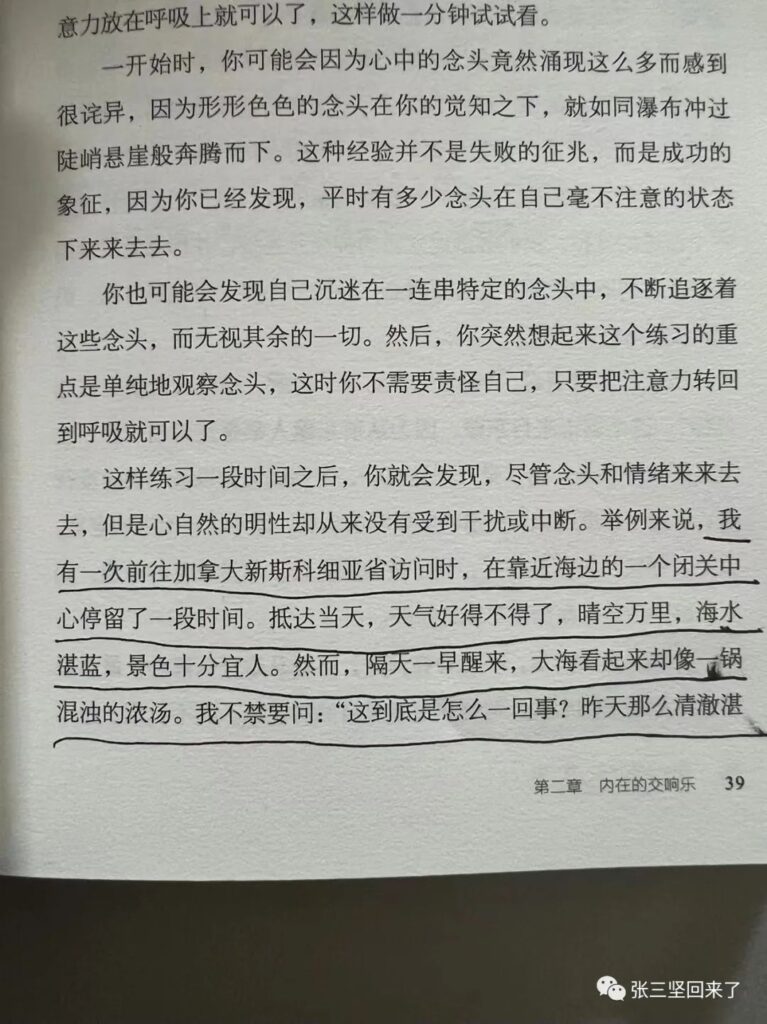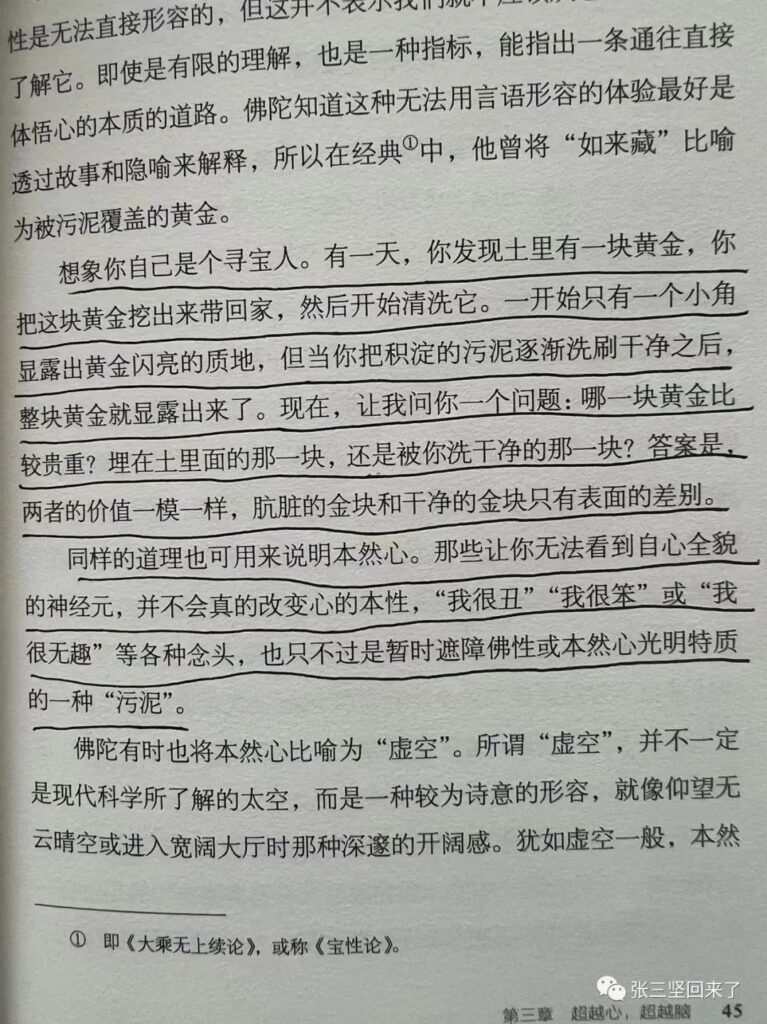Established and Walking Together
I have been at the established age* for a whole year now. At 31, it’s an age that’s neither too young nor too old, with still a long journey ahead. (*Translator note: Confucian philosophy suggests that by the age of thirty, an individual should have established themselves, typically in terms of career, family, or personal development. )
My mood hasn’t been very high these past few days, perhaps due to the weather or recent circumstances. I originally wanted to play and sing a song called ‘Lonely Dream’ for everyone, but I decided to wait until I put on new clothes and accessories to meet you all properly. So, on such an ordinary yet special day, I want to share a book with everyone and some of my thoughts.



| Texts in the book: In the beginning, you may be surprised by the sheer number and variety of thoughts that pour through your awareness like a waterfall rushing over a steep cliff. An experience of this sort is not a sign of failure. It’s a sign of success. You’ve begun to recognize how many thoughts ordinarily pass through your mind without your even noticing them.You may also find yourself getting caught up in a particular train of thought and following it while ignoring everything else. Then suddenly you remember that the point of the exercise is simply to watch your thoughts. Instead of punishing or condemning yourself, just go back to focusing on your breath.If you keep up this practice, you’ll find that even though thoughts and emotions come and go, the mind’s natural clarity is never disturbed or interrupted. To use an example, during a trip to Nova Scotia, I visited a retreat house that was quite near the ocean. The day I arrived, the weather was perfect: The sky was cloudless and the ocean was a deep, clear blue—very pleasant to look at. When I woke the next morning, though, the ocean looked like a thick, muddy soup. I wondered, “What happened to the ocean? Yesterday it was so clear and blue, and today it’s suddenly dirty.” I took a walk down to the shore, and couldn’t see any obvious reason for the change. There wasn’t any mud in the water or along the beach. Then I looked up at the sky and saw that it was thick with dark greenish clouds; and I realized it was the color of the clouds that had changed the color of the ocean. The water itself, when I looked closely at it, was still clean and clear. The mind, in many ways, is like the ocean. The “color” changes from day to day or moment to moment, reflecting the thoughts, emotions, and so on passing “overhead,” so to speak. But the mind itself, like the ocean, never changes: It’s always clean and clear, no matter what it’s reflecting. Practicing mindfulness may seem hard at first, but the point is not how successful you are right away. What seems impossible at present becomes easier with practice. There’s nothing you can’t get used to. Just think about all the unpleasant things you’ve accepted as ordinary, like wading through traffic or dealing with a bad-tempered relative or coworker. Becoming mindful is a gradual process of establishing new neuronal connections and inhibiting the gossip among old ones. It requires patiently taking one small step at a time, practicing in very short intervals. There’s an old Tibetan saying: “If you walk with haste, you won’t reach Lhasa. Walk gently and you’ll reach your goal.” This proverb comes from the days when people in eastern Tibet would make a pilgrimage to Lhasa, the capital city, in the central region of the country. Pilgrims who wanted to get there quickly would walk as fast as they could, but because of the pace they set for themselves, they’d get tired or sick and have to return home. |
Your ‘heart’ is like your home, a place for you to rest and rely on. Your home will gather dust, and become messy during your daily activities, and your pet cat will shed fur everywhere, and even topple over the trash bin. So you need to sweep, mop, vacuum, tidy up, scoop the litter, refill food and water for the pet, clean up the dining table, wash the dishes after meals, and take out the trash. It might seem tedious, but you do need to take care of it because you need to live there — just as you can only live within your own heart.

| Texts in the book:
…describe in words could best be explained through stories and metaphors. In one text, he compared tathagatagarbha to a nugget of gold covered with mud and dirt. Imagine you’re a treasure hunter. One day you discover a chunk of metal in the ground. You dig a hole, pull out the metal, take it home, and start to clean it. At first, one corner of the nugget reveals itself, bright and shining. Gradually, as you wash away the accumulated dirt and mud, the whole chunk is revealed as gold. So let me ask: Which is more valuable—the chunk of gold buried in mud, or the one you cleaned? Actually, the value is equal. Any difference between the dirty nugget and the clean is superficial. The same can be said of natural mind. The neuronal gossip that keeps you from seeing your mind in its fullness doesn’t really change the fundamental nature of your mind. Thoughts like “I’m ugly,” “I’m stupid,” or “I’m boring” are nothing more than a kind of biological mud, temporarily obscuring the brilliant qualities of Buddha nature, or natural mind. Sometimes the Buddha compared natural mind to space, not necessarily as space is understood by modern science, but rather in the poetic sense of the profound experience of openness one feels when looking up at a cloudless sky or entering a very large room. Like space, natural mind… |
I wish everyone can protect their state of mind and be happy every day of their lives.
Now, I am at the age of an established state, and let us forever walk side by side.






Focus is another form of meditation so let’s try 😉
翻译 Translate
เราเหมือนกันเกินไป🤣🤣🤣
翻译 Translate
Don’t be serious about anything. That’s too shall pass. Do our best at that time 🥰
翻译 Translate
Yes ,stay strong and waking together .
翻译 Translate
Hi, Hanbelina
翻译 Translate
Looking back at when I was thirty, my mindset was nowhere near as open-minded as San Jian’s.
翻译 Translate